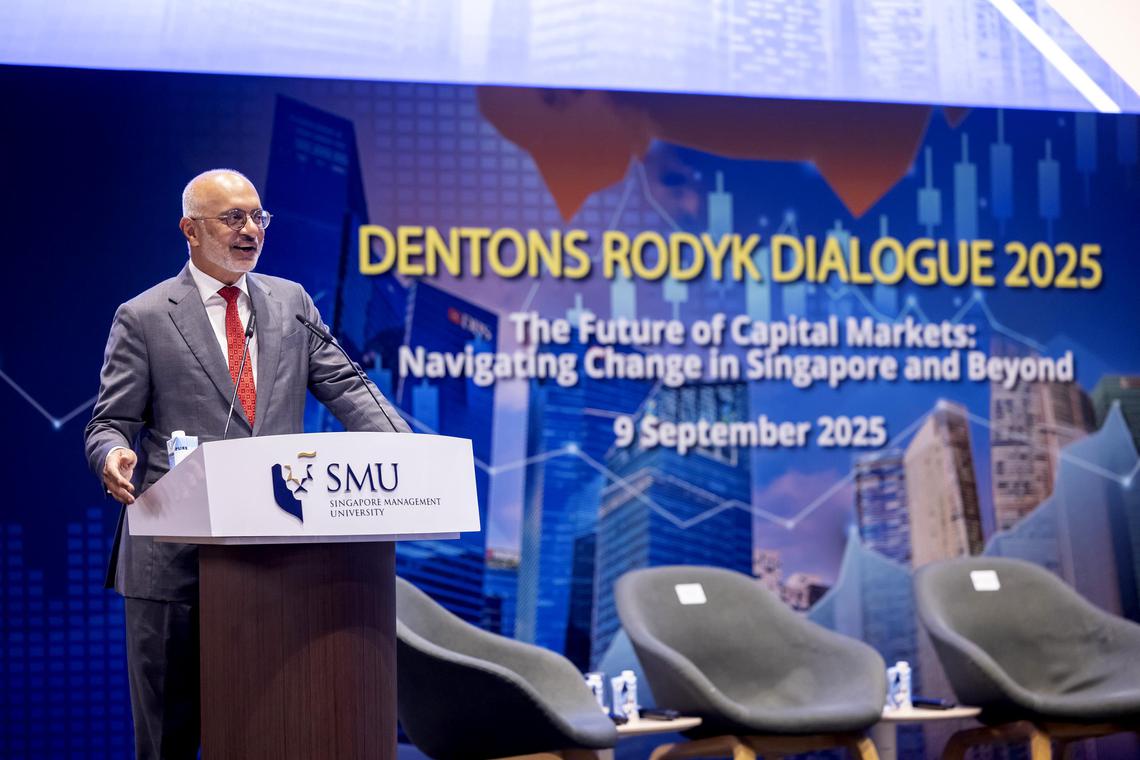
Singapore’s equity market could tap technology to outpace regional rivals: Piyush Gupta
SINGAPORE – Singapore should explore innovative moves to reclaim leadership in the equity market instead of trying to catch up with its regional peers, said former DBS chief executive Piyush Gupta.
Harnessing technology such as blockchain and tokenisation could be the key to gaining an edge over its peers, he added.
“For Singapore to really establish a leadership position in these markets, we shouldn’t be focused just on playing catch-up. We should really be thinking and trying to figure out… how do we redefine the way that this can be done?”
Noting that Singapore is lagging behind its peers, he said: “We used to be the go-to exchange in Asean. Today, we’re not the go-to exchange in Asean. Indonesia, Thailand, Malaysia are doing better.”
Mr Gupta, who is also chairman of Singapore Management University, was speaking at Dentons Rodyk Dialogue 2025 held at the university’s Yong Pung How School of Law on Sept 9.
He listed some investors’ concerns about Singapore’s equity market, such as lower valuations, limited growth multiples compared with larger, more liquid markets, as well as a high cost of listing and more onerous compliance requirements.
While acknowledging that recent initiatives such as
the Monetary Authority of Singapore’s (MAS) $5 billion Equity Market Development Programme (EQDP)
are steps in the right direction, he questioned their long-term impact.
“The EQDP is not a bad idea. I worry that $5 billion doesn’t really move the needle given our market capitalisation,” he said.
Drawing on his experience leading one of the region’s largest banks through a decade of digital transformation, Mr Gupta added that technology is a potential game changer for capital markets.
He proposed using distributed ledger technology (DLT), such as blockchain that can securely record transactions across a network of computers, and smart contracts – digital contracts on a blockchain that are automatically executed when predetermined terms and conditions are met – for compliance and oversight.
Regulators could be granted direct access to DLT disclosure ledgers, and smart contracts can automatically notify regulators of late filings or discrepancies between reported and actual performance, he said.
He added that smart contracts can enforce disclosure of voting outcomes immediately, making governance more transparent. Blockchain technology also allows for the programmatic distribution of annual general meeting notices, resolutions and voting results directly within a smart contract.
He highlighted the potential of tokenisation to increase liquidity and retail participation.
Dentons global vice-chair and Asean chief executive Gerald Singham highlighted that companies are taking longer to go public, which challenges bourses like the Singapore Exchange (SGX).
“Traditional public listings are slowing as companies choose to remain private longer, sidestepping the scrutiny of regulators, swings of the market and the relentless gaze of shareholders. The IPO, once seen as a milestone of growth, is no longer the only path to success,” he noted.
“At the same time, private markets are rising with unprecedented momentum, providing companies with capital flexibility and control.”
Referring to EQDP, he said: “Yet, revitalising SGX requires more than just liquidity support. It demands innovation, global positioning and strong partnerships.”

Mr Gerald Singham, Dentons global vice-chair and Asean CEO, speaking at the Dentons Rodyk Dialogue 2025.
PHOTO: DENTONS RODYK & DAVIDSON
SGX Group’s senior managing director Pol de Win, who was also at the dialogue, said the exchange welcomes discussions on areas of improvement, citing the formation of an equities market review group to work towards practical solutions and initiatives.
He added that SGX is optimistic thanks to the supply of companies emerging in this region, as well as those that have reached the maturity and scale to come to the public markets.
“I’m also optimistic because I strongly believe that great companies with sound strategies and the track record of performance delivery can do actually really well in our market,” he said, pointing to DBS Bank as an example.
Mr de Win added that ensuring ample liquidity in the local market is a priority for right price formation dynamics.
“This has to apply not only to Straits Times Index and real estate stocks, but to the broader market as well, and, therefore, ensuring sufficient investor focus and attention on the broader market, especially the mid-cap segment, is critical.”
Furthermore, regulatory frameworks need to be globally competitive as issuers and investors have choices, he said.
“As Singapore itself or as a small place, our ability to be relevant relies on our ability to achieve greater capital market integration with other jurisdictions.”

Singapore Management University chairman and former DBS chief executive Piyush Gupta (left) and SGX Group’s senior managing director Pol de Win speaking at the Dentons Rodyk Dialogue 2025.
PHOTO: DENTONS RODYK & DAVIDSON
He noted that Singapore is making good progress, pointing to the Straits Times Index reaching an all-time high.
On Sept 10, the index surged to a record 4,346.46 points, driven by a historic high in DBS’ share price.
“That’s a reflection of general investor confidence in our leading stocks, and it’s also indicating that we’re approaching more of a risk-on environment, which is particularly important for new listing activity.”
He added that listing momentum has been healthy, with firms such as NTT DC Reit, Info-Tech Systems and Dezign Format debuting on SGX in the past two months.
“The review group is working towards completing the review and recommendations in the coming months.”
In July, MAS announced it appointed the first batch of EQDP asset managers, placing an initial amount of $1.1 billion with these managers, and committed $50 million to boost equity research and product listings.
